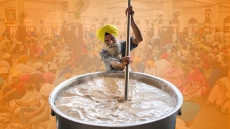This year’s production of All’s Well That Ends Well at Bard on the Beach Shakespeare Festival was refreshing and colourful. I believe that this is the first time that a Shakespeare play has been presented in an Indian setting on Bard’s stage, and for the first time a play included Hindi dialogues. Co-directed by Johnna Wright (The Merry Wives of Windsor, 2016) and Rohit Chokhani (Artistic Director, Diwali in BC), All’s Well That Ends Well transports audiences to an India on the cusp of independence in 1946.
Helena, a privileged young Indian woman, secretly loves Bertram, an officer in the British Army. Cultural, social and political barriers stand between them – but Helena doesn’t give up, and her journey takes her into the heart of her own culture and identity as this tumultuous love story unfolds against a backdrop of dramatic societal change.
The play is unique in the fact that such a theme has never been explored before at Bard on the Beach. India being a country rich in culture and diversity, the play includes many Indian elements that add more colour and life to the play. Additionally, by basing the play during India’s independence, the story deals with different themes prevalent during the time such as love, hatred, patriotism and identity. While Helena strives to prove her love and loyalty towards Bertram, the emotion of hatred and betrayal is clearly evident among other characters and groups divided by borders.
What I thoroughly enjoyed is the good use of music and historical records that gave the audience a glimpse of India’s independence period. Even the celebrations depicted through regional Indian music and dancing were a pleasant addition. What impacted me was the play’s end, what does one do when asked to choose between love and patriotism? I realized that during independence, many people may have had to decide between the two, and live with the grief of letting go of the other all their life. Though the play was simply a portrayal of a wife’s love for her husband, the co-directors delivered more than the plot – they brought India’s struggle and history to the forefront as well.
All’s Well That Ends Well is a must-watch. It is playing on Bard’s Howard Family Stage till August 11. Tickets at https://bardonthebeach.org/2019/alls-well-that-ends-well/
Photo: Tim Matheson
